Aristotle Biography 6: Writings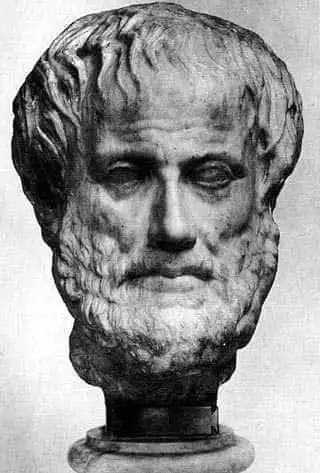 The life and time of the Greek PhilosopherAristotle's writing
Diogenes Laertius reports that Aristotle was teaching rhetoric and dialectic at the Academy. That is quite likely, but it is equally likely that just about every teacher there dealt with those two subjects, which were also closely connected, both dealing with the intellectual process of reaching truth. The Academy prided itself of taking rhetoric much more seriously than Isocrates did. Speech should cherish content, not ornament, and dialectic was the constructive dialogue method, wherein the teacher would lead the students to conclusions, as if they had reached them by themselves. A rhetoric technique, indeed.
Diogenes Laertius gives a long list of texts by Aristotle, claiming them to be 445,270 lines in all. Some of this writing, Aristotle must have done during his twenty years at the Academy. He is said to have started with it already in his early twenties. These books were spread wide, and met with respect for their elegant style. Centuries later, even Cicero praised them for their eloquence. He spoke of "the suave style of Aristotle" and called his writing "A river of gold." They were mostly dialogues, presenting the teachings and theories of the Academy, probably in a fashion more direct and easily comprehendible than that of Plato's works. It seems that Aristotle, contrary to his teacher, used himself as the leader of the conversations. Unfortunately, only minute fragments remain of those books.
That these writings would be modest in tone and content, in regard to Plato and the teachings at the Academy, is implied by Dionysius of Halicarnassus, who argues about Rhetoric that Aristotle could have been "no mere youth" when composing it, but "at the height of his powers". Any writing of youth would have been less independent, less ascertained. Later in the same text, Dionysius argues strongly against the possibility that Aristotle could have written such a work "at which time Aristotle was still a pupil of Plato, and he went on to be thirty-seven before becoming the head of a school or forming a philosophical sect of his own." He regards it as "feeble and improbable" to argue for Aristotle having written Rhetoric and other important works while "still a disciple in Plato's school."
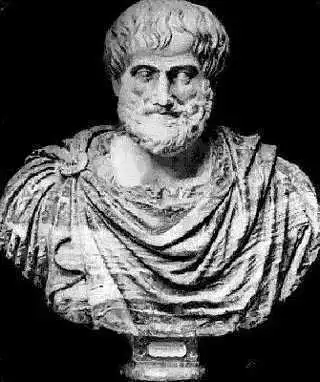 Aristotle.
Regarding Aristotle's twenty years in the Academy, almost nothing is known. He did not accompany Plato on his last voyage to Syracuse, nor did he get involved in any other matters of which there is mention in any of the classical sources. Both Dionysius of Halicarnassus and Diogenes Laertius are very scarce indeed with words on Aristotle's two decades in the Academy, mainly just reporting the time-span. I wonder how much Aristotle can really have written while in the Academy, or just how popular such writing can have been, not to leave other marks on his time in that school. Twenty years is a long time, and what does remain of Aristotle's work proves clearly that he had an active mind and an equally active pen. He must have used both extensively, and his mouth, too, while in the Academy. Had Aristotle succeeded in keeping still for so many years, he would not have been the man to start writing with such vigor later on. As Aristotle would be the first to state — people don't change that much, especially when remaining in the same kind of environment throughout. Maybe Aristotle was working intensely on the kind of texts and research that was to be his trademark, already early on in the Academy, but by himself, piling up notebooks and keeping a low profile about it. The Academy seems to have had an openness about differing opinions, but the tone of it was still set by Plato, and Aristotle had little reason to push for his own alternate perspectives, while the old man was still around. Experts on Aristotle and his writing never cease to debate how his science and writing evolved. Werner Jaeger (1912 and 1923) and others of the 20th century's first half or so, have argued for a development from very Platonic standpoints and perspectives, toward a so to speak Aristotelian one later on. The supporters of this view have suggested a chronological order of his texts, based on that theory. Jager sees three major periods — the first, to 347 BC, where Aristotle defended Platon's theories, the second to 335 BC, with an increased critical attitude toward Plato, especially the theory of Forms, and the third after 335, where Aristotle had his own independent principles, based on empirical science. Others, notably Ingemar Düring, have expressed doubts — Düring so far as to turn Jaeger's thesis upside down, claiming that it is just as plausible that Aristotle in his youth expressed a more significant diversion from Plato's ideas — as if in youthful rebellion — only to conform to them, more or less, at old age. There are no facts on which to lean heavily. Not only is a dating of Aristotle's texts uncertain, but so is their content, in so far as what parts of each book were really written and compiled that way by Aristotle — and not by the librarian who made the first published edition of them, centuries later. The volumes may have been compiled from texts of different times in Aristotle's life. Then again, there are several arguments for the compilations mostly representing the order in which they were written and meant to be organized. Regarding Poetics, that is irrelevant, since it is generally accepted that this short text is not a compilation at all. What's missing from it, the part on comedy, may or may not have been written, at about the same time or not — we do not know — but the extant part, on tragedy, is homogenous enough to clearly be one text, written as such. It is also generally assumed to be one of Aristotle's later texts. It is not certain, and opinions about it have differed some, but it is likely. Another question about Aristotle's corpus, raised not only in recent years, is how much of it is really Aristotle's. The idea was first presented by J. Cook Wilson and R. Shute in 1879 and 1888. Felix Grayeff did in 1974 argue for most of it being compilations and continuous editions of the Peripatetic school, with many additions and revisions through time. The very rhapsodic style of the manuscripts makes it hard to identify a single writer, so certainly, but Grayeff also finds support in the corpus containing: "inconsistencies, variants, repetitions and doublets, interrupted arguments and excursions, references to passages that could not be found, even manifest contradictions." He points out the lack of a "consistent flow of thought". On the other hand, what else is to be expected from a writing — in the form of unedited notes — compiled during a period of at least a few decades? Even if they were all of one man's pen, they would be very likely to contain all the anomalies that Grayeff finds in them. Even in a body of writing with much more of a finishing touch to it, such inconsistencies are to be expected. Grayeff and others of the same opinion need first to prove that an author cannot change during a lifetime — good luck with that. Actually, the fact that Aristotle's texts have such a rude form of unpolished notes with little value in literary style, argues for them being the untouched work of one man. If indeed Aristotle's pupils and followers hade edited the texts, they would probably have wanted to give them a more dignified language, and they would be very careful to omit any inconsistencies. Anything else would have been a mockery of the founder of their school. It is much more plausible, then, that either the texts were removed from their care at an early stage, or they felt such reverence toward Aristotle that they would not dream of mingling with his texts.
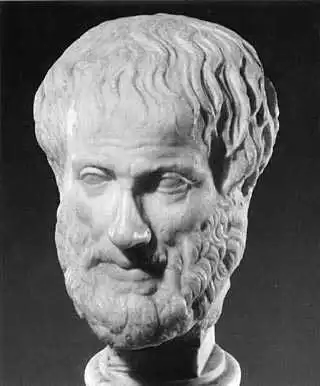 Aristotle.
Esoteric and exoteric writingTwenty years is a long time, and in the case of Aristotle in the Academy, a time of his life when he would hardly have been able to stay a passive student only, nor a teacher just repeating the thoughts of others. He entered the school at the age of 17 or 18, and stayed until he was 37 or 38. Even if he spent the rest of his teens exercising his ears and not his mouth, that must have changed in his 20s and 30s. Let's say that in his 20s Aristotle was devoted to Plato's theories, first learning and then mastering them — then in his 30s it is quite likely that he must have started objecting to them, sketching instead his own thoughts and theories. If not, it would just not have been Aristotle.Maybe it was not — at least not the Aristotle we fathom by reading the rich esoteric work remaining. These texts may have been edits by his students. Reportedly, they left the Lyceum at the death of his successor Theophrastus, some 26 years after that of Aristotle. In that period, the texts we regard as Aristotle's own writing may have been edited notes of his students, working hard to keep their teacher's theories intact. This is a familiar pattern with the successors and disciples of many thinkers — Socrates of course being one of them. The almost sloppy style of the esoteric texts make it even more plausible, if this compilation was from the notes and memories of several students of Aristotle. Instead of his own notes for lectures he was going to give, the texts may have been notes made by students at these lectures, or after them. Such notes would, if Aristotle was not a very slow speaker, by necessity have been written in a rhapsodic style, with little lingual elegance. Then, the real writings of Aristotle, in the language he was able, praised by the likes of Cicero, were lost like so many other books of that era. By pure chance — let's call it divine intervention, the deus ex machina — the notes were saved, because they were handled in a very different way. Aristotle may have written numerous dialogues and elaborate treatises for a general audience, regarding those as his major achievements. He cannot have imagined that simple lecture notes — his, or his students' — could remain and become world classics. Again, if they were Aristotle's own writing, it is quite possible that they were not notes he made in preparation for his own classes. They could have been private writings, done at the Academy and on, in his personal process of thought. That, too, would explain their simple style. I would wager that at least some of those texts were a young Aristotle, pondering the lectures of Plato, penetrating his own mind, and experimenting with his own conclusions. Not that it alters the significance of the texts considerably, nor how they should be interpreted. In any case, they represent Aristotle's thoughts, very much so. The rough style is proof of it — when trying to adapt the wisdom of another, one tends to care about style, but when writing down one's own thoughts, if not intending to have it published, one is not as anxious about the literary quality. For Aristotle, the reading out loud of books that was the standard of his time, was not his cup of tea, at least not exclusively. He gathered his own library in the Lyceum, and it may have been the first private library of significance. This, Aristotle used for his own study, in the privacy of his home. Reading in silence, he must have regarded the texts as aids in the process of personal thought, more so than Plato and other predecessors. To Aristotle, the nature of the book was less of a dialogue than a monologue. His own texts, then, may have been a continued monologue where he intended himself as the major or only listener — at least in the many years before he formed his own school. After that, the monologues continued to be his, but others were invited to listen in. If this is the case, it may be possible for the skilled scholar to sort Aristotle's works according to the extent they seem to be directed to other listeners. Whatever the case, Aristotle cannot have been as fond of the dialogue as Plato and Socrates were. His way of reasoning is both personal and impatient, not leaving much room for a student to give remarks, ask questions or raise objections. Aristotle rushed on, from questions to conclusions, and the students could hurry to tag along, or he would just leave them behind. This is another reason for the ragged style of Aristotle's texts — he did not pay much attention to attracting others, but was quite pleased with following his own train of thoughts. Furthermore, in the literature on Aristotle it is generally assumed that his dialogues and other exoteric writings belonged to his early years, when he was still in the Academy, and that in Lyceum he wrote exclusively the esoteric works, which are in our possession. That is quite uncertain. It is evident that Aristotle himself saw them as two different kinds of writing, without denouncing the former or declaring any commitment only to the latter. He may very well have kept on writing both kinds of works, throughout his life. Although Aristotle's exoteric works were respected and widely read in the antique era, they were never any way near the popularity of Plato's books. Still, the respect they received implies that they were more than just the first trials with the pen of a young scholar. Would Cicero have fallen for a juvenile writer? Aristotle was not that modest about his own qualities, so he would have liked to take the example of his teacher and try to reach a general audience — especially when expressing thoughts of his own. Now, the division into exoteric and esoteric, which Aristotle did himself make on his writing, is mostly interpreted as a very simple classification into books for people outside or inside the Lyceum, with no significance to the content of the books per se. Yet, writing for a general audience is without doubt quite different from writing to one's own students, or oneself. Aristotle seems not to have been the kind of teacher to keep the essence of his thoughts for a secluded group of initiates, like some religious cult, but he would have understood the importance of speaking differently to the public and to scholars. It is clear in his texts that Aristotle regarded the public as significantly lacking in intellectual capacities. When writing for the relatively uneducated, Aristotle would have needed to keep his theories simple, in a familiar framework, and fill his literary style with attractive decorations. He would have expected those readers to be familiar with Plato's works. Thus, Aristotle would surely have decided to keep both his writing style and his theories in the vicinity of Plato's, when writing for that audience. So, the impression of these books would have been one of more closeness to Plato's ideas and lines of thought, than with the esoteric works. Instead of signifying a development of Aristotle's mind, farther from that of Plato, it may have been little but an adaption to the readers he had in mind. Then, such writing for the general audience was likely to inspire Aristotle less and less, as time progressed. When he had reached far in exploring the world with the sharp tool of his own reasoning, Aristotle must have been inclined to stick to that perspective throughout, not bothering so much with the exoteric writing. Where Plato remained a popular writer of such magnitude, even in his own days, that he must have found it his foremost calling, Aristotle was more of a secluded intellectual, with little patience to translate his science into words accessible to the public. For him, by time, the esoteric work for the learned fellow scholar was the essential thing.
Aristotle actually had a division into two categories of his esoteric writing. "Hypomnematic" texts were notes made to aid the memory, just as what Plato talked about in his criticism of books as a way of learning philosophy, and also material collected for further work. The "acroamatic" texts are the treatises that remain today. NEXT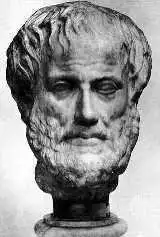
AristotleIntroductionAristotle's LifeTimelineAristotle's PoeticsAristotle's Cosmology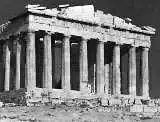
The Greek PhilosophersAbout CookiesMy Other WebsitesCREATION MYTHSMyths in general and myths of creation in particular.
TAOISMThe wisdom of Taoism and the Tao Te Ching, its ancient source.
LIFE ENERGYAn encyclopedia of life energy concepts around the world.
QI ENERGY EXERCISESQi (also spelled chi or ki) explained, with exercises to increase it.
I CHINGThe ancient Chinese system of divination and free online reading.
TAROTTarot card meanings in divination and a free online spread.
ASTROLOGYThe complete horoscope chart and how to read it.
MY AMAZON PAGE
MY YOUTUBE AIKIDO
MY YOUTUBE ART
MY FACEBOOK
MY INSTAGRAM
MY TWITTER
STENUDD PÅ SVENSKA
|
 Cosmos of the Ancients
Cosmos of the Ancients